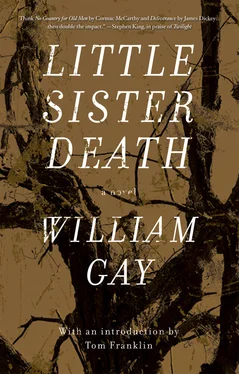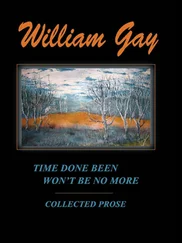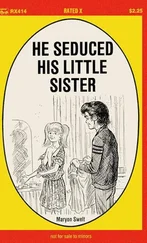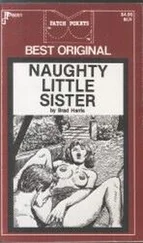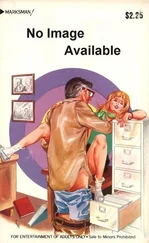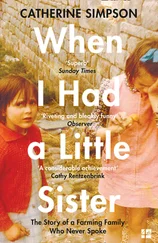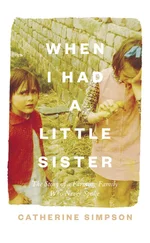No. I wanted to be with you.
We could stay nights in a motel, then. If the house upsets you that much, I mean.
No. That would be crazy, even if we could afford it. It’ll be all right, David. Really. You’re committed to do the book, and that’s the important thing right now.
His silence bespoke assent but he already knew better, had known from his first night here, from before that. From the day he had come here with Greaves, the night he had read the book in Chicago. The book he was writing was important to him, but it was becoming secondary to the mystery. All the things that were supposed to have gone on down here: had they or hadn’t they? Had all those people lied? It was over a century ago, layered with myth and folklore, but what was the basis of it? He felt he had the pieces to an enormously complex puzzle, needed only time to figure out where they went.
Night. She slept, or perhaps she feigned sleep. Lately he thought that she sometimes did. He could feel her regular breathing against his back. He couldn’t hear the sounds outside the bedroom window, only the mesmeric whirring of the fan. The fan negated the heat, the whippoorwills, created an artificial environment of no sound no climate no time that Corrie needed to induce sleep.
The first day in the house it hadn’t occurred to them the place wasn’t air conditioned, and that night they had lain sleepless and sweaty in the dark. The next day he went to Beale Station and bought a fan to use until the air conditioner was installed.
Binder had told himself that he could sleep anywhere, but he couldn’t tonight. His mind seemed wired on adrenaline, his eyes kept opening to stare upward at the unseen ceiling, and when he tried to clear his mind, to be completely blank, scenes from the book he was beginning flickered across it bright and chaotic as snippets of colored film.
It had to work. Too much riding on it, too many things. Lying there in the dark, he itemized them in his mind like a man going over things he had bought on credit and wondering how he was going to pay for them.
The money. All his money — Corrie’s money, really, but what’s mine is yours — thrown into the pot for a single quixotic toss of the dice. All right. Six-month lease, eighteen hundred dollars. Twenty-four hundred for a used pickup truck. Four hundred to an obstetrician, and more to come there. Utility bills. Food for twenty-four weeks at…seventy-five? Ninety-five hundred dollars to start with.
He thought of Stephie. Of the nameless and faceless child in Corrie’s womb. How could Corrie have let him do this? How could she have stood by and calmly watched him put all her hard-won eggs in one basket?
Well, to start with, she didn’t know about the location of all the eggs. He expected she believed that a great many of them still resided at the Blount County bank.
Her sleeping body stirred against him and he felt a rush of love for her. He needed her. He needed her practicality, her intense concern for the mundane minutiae of the world he wouldn’t or couldn’t cope with. He even needed her faint ridicule; it sharpened him, kept him moving, let him know when he was drifting too close to the edge that had always fascinated him. Yet a part of his mind stood apart, detached and uninvolved, and asked him how much he would love her if there ever came a time when he didn’t need her.
The book had thrown her off balance. She hadn’t expected the money, the good reviews, the award it received. He could imagine her drawing back, regrouping, confused, thinking, Well, maybe he knows what he’s doing after all. Maybe I ought to give him more rope. Maybe he won’t hang himself.
Her hips moved against his thigh and he wondered what she was dreaming. He smiled wryly into the darkness. Your mind is as cold as a cat’s heart, but your body didn’t get the news.
How much could he realistically expect? Fifteen thousand? Twenty? If the book went over there might be a film sale…
He got up furtively and pulled on his pants. He took up his lighter and cigarettes and went out of the dark bedroom through the high-ceilinged foyer to the porch. The door was open save a screen and a cool breeze blew off the creek. He opened the screen and went out into the sounds of the summer night. He sat on the top step smoking and listening to the crying of the crickets and the lonesome call of an owl from somewhere out there in the far-off darkness.
Here in the moonlight the world seemed drained of color. The outlines of objects took on an added clarity, as if their edges had been sketched in charcoal. For no reason he could name he found himself watching the old toolshed, a leaning structure of gray planking set against the base of the hill. Above it the hill undulated eastward, cold and silverlooking in the moonlight, broken only by the dark stains of cedars. He found himself waiting, staring intently at the doorway of the toolshed, a rectangle of Cimmerian darkness that seemed beyond darkness, darkness multiplied by itself, and he was thinking, Something is going to happen. He sensed a change in the air. It had grown denser yet, so that even the crying of the nightbirds could not pierce it. He seemed locked in a void of silence. The crickets had ceased or the roaring in his ears diminished them. He had fallen into a helpless, volitionless state, no longer a participant but an observer, a person things happen to, straining to see he knew not what but watching with rapt fascination an oblong abscission into warm, mustysmelling darkness.
He became conscious of a painful constriction of his chest and realized suddenly that he had been holding his breath. The cigarette burned his fingers. He looked down when he put out the cigarette and when he looked up he could hear the nightbirds again and the toolshed had lost its air of dark menace. It was only a shakeroofed outbuilding collapsing infinitesimally slowly under its own weight.
He felt chilled and shaky. All right, he told the house. We both know you can do it. You don’t have to prove anything to me.
The roof was already hot to the touch at eight a.m. and by nine he could feel slick trails of sweat across his ribcage and down his back. The white shirt was plastered across his shoulder blades, and after a while he took it off and balled it in his fist and tossed it off the edge of the roof.
He moved carefully toward the ridge of the house, balancing the antenna and pole and watching his tennis-shoed feet, careful of their placement. Some of the slates were loose, earlier one had skittered beneath a foot and fallen to the concrete patio below, a dizzying distance from the apex of the roof.
There was no way to secure anything on the slate roof, and eventually he settled for leaning the antenna pole against one of the chimneys and securing it with wire. When he released it the pole skewed sideways with the antenna pointed toward the earth. No signal there, Binder knew, and he stood for a moment gazing up the sheer plumb side of the brick flue. No purchase for hands or feet. No thought when it was built one hundred and twenty years ago of handholds for Binder to climb, nothing to lash an antenna to. He squatted and went crablike down the roof to the edge and down the ladder to the kitchen roof, another ladder to the ground. In a few minutes he returned with a stepladder and a length of clothesline wire.
He balanced the ladder and climbed it with painstaking care, fingertips almost prehensile against the brick, a dizzy fear of heights knotted in the pit of his stomach, freshets of nervous perspiration starting from seemingly every pore.
The top. His breath whistling in his throat, he locked his hands over the lip of the chimney, feeling a heady rush of relief in a world of intangibles. Here was something a man could cling to. A rock in all this tumult. He shifted his weight, leant out over space, reaching with his right hand for the antenna, his left clinging to the top of the chimney. Then the century-old mortar gave and the brick came away in his hand, the ladder kicking out beneath him, Binder hitting the roof hard and fighting to keep consciousness, everything a dervish of movement washed in red haze. Hitting the slate on his back then and rolling, fingers clawing for purchase at the very air, grasping the antenna wire desperately and feeling it tauten momentarily and come away from the antenna with a rush of relief in his hands and his descent accelerate, heard the antenna crash to the roof somewhere above him, the elements skirting against the roof. He was grasping at the slate, tearing at it with his nails, after what seemed like hours slowing his descent and ending near the eave, every muscle of his body taut and the fingers of both hands hooked over the rough edges of a tier of slate. His head and his fingertips hurt. The world looked filtered through a red miasma of fear and anger at his own stupidity. He could feel blood soaking through the hair on his right temple, see it trickle down the index and second finger on his left hand.
Читать дальше
